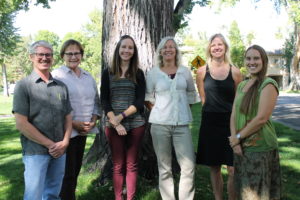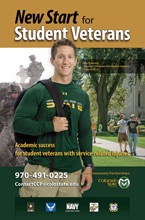Occupational Therapy program offers veterans much-needed REST
by Melissa Leavenworth | November 10, 2016 8:29 AM
Aaron Eakman, assistant professor and director of research for the New Start for Student Veterans program at Colorado State University, is helping post-9/11 student veterans sleep more soundly.
Eakman heads the Restoring Effective Sleep Tranquility (REST) program in the Department of Occupational Therapy. The program, initially funded by Wounded Warrior Project and presently sustained within the New Start for Student Veterans program, aims to help veterans reduce symptoms of chronic insomnia that may stem from their military service.
Each year, Wounded Warrior Project releases a survey-generated annual report. “It was the first year they had identified sleep as the most significant problem their alumni were having,” Eakman said. “In past years, post-traumatic stress disorder has been of highest concern.”
 [1]
[1]Chronic insomnia
Chronic insomnia is characterized as having trouble falling asleep, staying asleep throughout the night, or waking before a desired time for a period of at least three months. Insomnia is often accompanied by daytime complaints of fatigue and tiredness, as well as decreased daily functioning.
The veterans that participate in the REST program have had sleep difficulties for varying amounts of time, ranging from 12 to 180 months. Many have adopted unhealthy behaviors that they intuitively feel will help them gain more sleep, but actually further inhibit quality sleep.
There are certain perpetuating factors that are likely to disrupt a veteran’s healthy sleeping habits. In basic training, soldiers adopt a sleep schedule that allows them to be operationally ready at any given time. It is rare that they get more than six hours of sleep each night, prompting them to make up for sleep wherever they can, usually by napping.
Veterans bring these sleeping habits home and try to take naps during the day or stay in bed longer to gain more sleep, but this inhibits healthy sleep. Veterans may have injuries or trauma associated with military service that perpetuate their sleeping troubles. Some may have frequent nightmares that wake them up from sleep. They may avoid sleep, or postpone it as long as possible, to escape the nightmares. “With this comes worry, concern and rumination,” Eakman said.
Cognitive behavioral therapy
“The 2016 practice guidelines for the American College of Physicians suggests the first line of treatment for chronic sleep problems should be cognitive behavioral therapy for insomnia [CBT-I] ,” Eakman said. The REST program takes into consideration the underlying theories and models of chronic insomnia, then tries to address those problems through behavior and thought restructuring.
CBT-I involves changing the participants’ routines and activities. In the REST program, Eakman and Natalie Rolle, both occupational therapists, work with veterans to change their sleep patterns and beliefs to initiate these changes. The therapy involves sleep restriction therapy, which limits how much time the participant may spend in bed to reset the veteran’s sleep system. Stimulus control therapy is addressed, which encourages participants to use their beds only for sleep and personal intimacy, and to get out of bed when they can’t sleep. Basic sleep hygiene methods such as maintaining a dark and quiet bedroom, staying active and engaged during the day, and limiting caffeine intake to early in the day are incorporated. Veterans also fill out a daily sleep diary that helps track their improvement.
“It gave me a better understanding of how the sleep cycle is supposed to work,” said participant Raleigh H. “Skill-building and sleep restriction worked best for me. It was difficult at first, but overall it taught me how my body should be operating by restricting naps, going to bed at a later time, and getting up at the same time every day.”
“After I got back from deployment, I was in denial about having PTSD,” said participant Alex M. “I would only sleep at night if I drank enough to knock me out. The first couple weeks of sleep deprivation were awful, but now I get about 7 ½ hours of sleep a night.”
 [2]Non-pharmalogical approach
[2]Non-pharmalogical approach
The REST program follows a non-pharmacological approach. “Often veterans will be prescribed a sleep medication and build a tolerance to it, so they take more,” Eakman said. “Then they shift to a new medication and build up a tolerance to that one.”
While medications that assist with sleep may help at first, sleep problems persist as tolerance builds. Therapy without medication is not easy, especially in the first couple of weeks.
Each week, these clinically trained occupational therapists work with veterans to provide the non-pharmacological intervention. They educate veterans on what contributes to insomnia and teach veterans better behaviors that promote healthy sleeping habits. The occupational therapists continue the betterment of their practices with the help of Don Posner at Stanford University. Posner has been delivering CBT-I for over 30 years and works primarily with people with anxiety.
“There are not enough trained practitioners in the community or in the VA who know how to safely implement this intervention,” Eakman said. “We hope to meet an unmet need in the community and provide veterans with essential services.”
Improved quality of sleep
A pilot study led by Eakman offered clinical evidence that veterans were gaining improved sleep through the REST program. While they saw little improvement in overall sleeping time, the quality of sleep was highly improved. They also noted reduced symptoms associated with nightmares and that veterans were able to fall asleep faster and maintain uninterrupted sleep until their desired wake time.
“I couldn’t fall asleep, and I would wake up 10 or more times most nights,” said participant Corey P. “I noticed the REST program let me drop the time I spent in bed trying to fall asleep to under 10 minutes. Now I only wake up a couple times throughout the night, if at all. My quality of sleep has definitely improved.”
Eakman’s second study, also funded by Wounded Warrior Project, contributes to mounting evidence that insomnia and PTSD co-occur and can influence each other.
“PTSD and depression often contribute to the development and perpetuation of chronic insomnia,” Eakman said. “As a result of getting better sleep, we saw decreased anxiety, stress and depression. We should be treating chronic insomnia as a primary diagnosis, even in the presence of these mental and behavioral health concerns.”
Second study
Eakman’s second study, a clinical trial, showed increased sleep, improved daily functioning and enhanced mental health. This enabled veterans to partake in daily life and work, as well as engage in leisure activities more comfortably.
“For me, I used to get about two hours of sleep a night, and now I get about seven hours straight,”said participant Melissa M. “I don’t wake up super early in the morning or have trouble staying asleep anymore. I have far fewer nightmares. I have PTSD, and it’s affected my daily life overall. It’s much better now because I’m getting sleep. It’s been a huge benefit, and I’m so thankful they offered it at school for free. Just a huge help I’d never expect to get from a school.”
REST program services are ongoing because of philanthropic support to the New Start for Student Veterans program from Dennis Repp. To learn more about the REST program, visit http://restweb.colostate.edu/[3] or contact Eakman at Aaron.Eakman@colostate.edu.
The REST pilot and clinical trial studies involved collaborators in the Department of Occupational Therapy, including the Center for Community Partnerships and Assistive Technology Resource Center; CSU’s Center for Mindfulness; CSU’s Department of Psychology; the Colorado School of Public Health; and University of Colorado Health.
The New Start for Student Veterans program is part of the Department of Occupational Therapy’s Center for Community Partnerships. The Department of Occupational Therapy is in CSU’s College of Health and Human Sciences.
- [Image]: http://source.colostate.edu/wp-content/uploads/2016/11/RESTOriginal.jpg
- [Image]: http://www.ccp.chhs.colostate.edu/files/NewStartPosterAcroHighest.pdf
- http://restweb.colostate.edu/: http://restweb.colostate.edu/
Source URL: https://source.colostate.edu/occupational-therapy-program-offers-veterans-much-needed-rest/
Copyright ©2024 SOURCE unless otherwise noted.